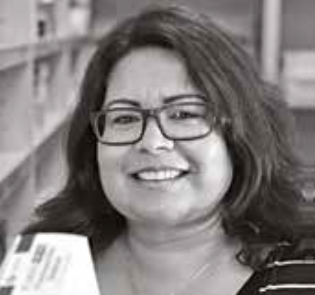 Dr Kali Hayward is a descendant from the Warnman people of Western Australia (WA). She was born in Adelaide, but she moved when she was very young to Meekatharra in WA. From there she spent time in Redfern, Sydney, until she moved to Mildura in Victoria.
Dr Kali Hayward is a descendant from the Warnman people of Western Australia (WA). She was born in Adelaide, but she moved when she was very young to Meekatharra in WA. From there she spent time in Redfern, Sydney, until she moved to Mildura in Victoria.
Kali’s father was a member of the Stolen Generation and passed away the year of her graduation, so he was unable to see her graduate. He was taken from his family when he was young and sent to Moore River Mission and later moved to Rolands Mission. He often spoke of the struggle not to speak his language due to it being forbidden in the mission. He met Kali’s mother in Derby, WA, where she was working as an enrolled nurse. Kali has two sisters. She remembers practicing her surgical skills on her younger sister by removing a wart with her mother’s dressmaker scissors, and her sister often reminds her of this. Kali has been married for 24 years to a Noongar man from WA, and she is the proud mother of four children aged between 12 and 23 years of age.
The journey into medicine was unconventional for Kali. She left her performing arts high school in Newtown, Sydney when she was 16 years-of-age and expecting her first baby, returning to Mildura to live with her parents. It was then that Kali had her first negative experience with a GP when she commenced antenatal care and was told by her GP that ‘she should be ashamed of herself’. She realised then how a GP’s attitudes, preconceived ideas, and racist behaviour can impact on patients. After the birth of her son, she returned to study to complete her secondary education. Kali and her family then moved to Adelaide where she did a clerical traineeship, and following the birth of her second son started working at the local kindergarten. She later enrolled in a foundation science course at the University of Adelaide, and it was there she met four medical students who inspired her to study medicine.
Kali applied for and was accepted into medicine. She had a further two more babies while continuing to study, all with the support of her husband. After graduation and embarking on a Prevocational General Practice Placements Program (PGPPP) rotation during her intern year, she decided to undertake general practice training. Kali did her general practice training with Adelaide to Outback, who she credits as being incredibly supportive of her as a registrar. She successfully obtained her Fellowship of The Royal Australian College of General Practitioners (FRACGP) in 2010. Kali is committed to Aboriginal and Torres Strait Islander health, and palliative care is an area she feels more and more drawn towards. In the future, she hopes to advocate for culturally appropriate centres for Aboriginal and Torres Strait Islander peoples with palliative care needs. Kali is the current president of the Australian Indigenous Doctors Association (AIDA), which represents another key area she is passionate about. Her presidency allows her to support Aboriginal and Torres Strait Islander GPs and general practice registrars.
On ‘closing the gap’, Kali believes there is a lot of work to do and that we can only narrow the gap if the federal government works in partnership with, and listens to, the Aboriginal and Torres Strait Islander communities. She sees the key to narrowing the gap as further support to increase the numbers of Aboriginal and Torres Strait Islander peoples in the health workforce, and particularly increasing the number of Aboriginal and Torres Strait Islander doctors to reach population parity (including the number of our Fellows across the medical colleges). Kali also believes that there is work to be done around exams and the exam process with strong advocacy regarding Aboriginal and Torres Strait Islander health training.
During general practice training, Kali completed two of her registrar terms at Nunkuwarrin Yunti, where she is now working. Nunkuwarrin Yunti is the largest Aboriginal community controlled health service in South Australia. She is also a medical educator and cultural educator, and the only Aboriginal GP working at Nunkuwarrin Yunti. However, she has two Aboriginal general practice registrars working with her this term.
At Nunkuwarrin Yunti, Kali works with non-Indigenous GPs who have worked in Aboriginal and Torres Strait Islander health for decades and acknowledges their support as amazing mentors. Kali also works closely with the Aboriginal and Torres Strait Islander health practitioners, administration staff, and transport drivers.
Kali has a fond and poignant memory of a patient who was so overcome by being treated by an Aboriginal doctor that she began to cry. When asked why, she said, ‘I never thought I would live to see an Aboriginal person become a doctor, and that they would be treating me.’
In her spare time, Kali enjoys Saturdays with her family, country music, and reading.
First published in: The Royal Australian College of General Practitioners. Closing the gap with the RACGP’s Aboriginal and Torres Strait Islander GPs. East Melbourne, Vic: RACGP, 2016